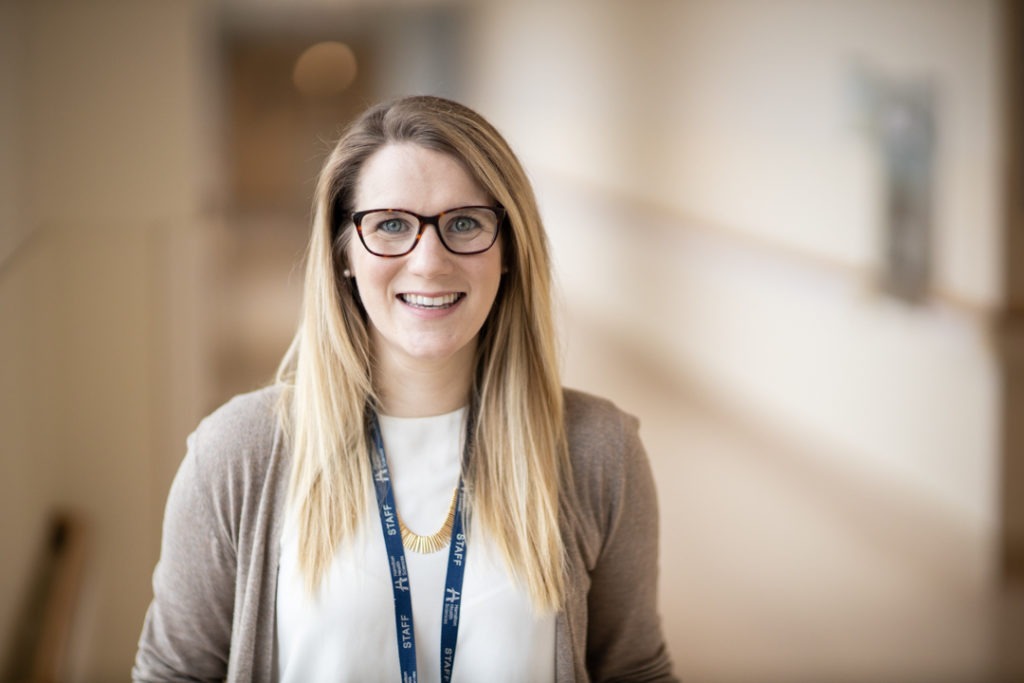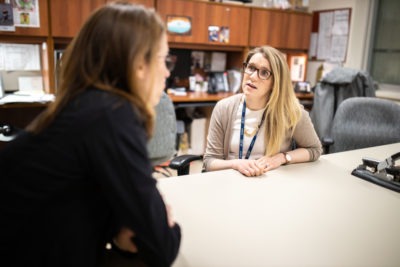
Introducing… a surgical social worker
First days on the job can be a mixed bag of emotions.
Some people arrive with a level of excitement only reserved for life’s major events. It’s not every day you start a new position, after all.
Others may experience fear or nervousness. They don’t want to rock the boat or signal to their colleagues they may not be the right person for the job.
And in health care, you may be in a position where you work directly with patients and families. The stakes are higher in those cases.
Katherine Craig is a social worker in the surgical oncology units at Hamilton Health Sciences’ (HHS) Juravinski Hospital. She has worked for HHS for three years.
She remembers her first day like it was yesterday.
“I remember thinking there is so much to take in,” says Katherine. “Even though I worked in health care before, I felt a little overwhelmed trying to learn new processes and systems.”
“There’s so much to learn at HHS, but so many people to help you figure it all out.”
From overwhelmed to feeling at home
Katherine recalls shadowing a fellow social worker to get a lay of the land, which made her feel more comfortable as time went on. She was grateful for that colleague and others who helped her get used to her new job.
“Initially, trying to keep up with everything seemed daunting,” she says. “But everyone was so helpful and friendly, it made things a lot easier.
“There’s so much to learn at HHS, but so many people to help you figure it all out.”

What does a surgery/surgical oncology social worker do?
Katherine’s primary role is to provide support to patients and families. This usually means planning for discharge and explaining services available to them outside the hospital.
In terms of counselling, Katherine helps patients adjust to their cancer diagnosis by developing a relationship with them in the early going. Then she will conduct various assessments to make sure they are coping with their illness and new diagnosis.
“It’s my job to face them, along with their families, with compassion and empathy as they go through this journey.”
In surgical oncology, there are patients of all ages with different circumstances and life stages. Some of them get an end-of-life diagnosis, but many do not, so it’s important for a social worker to be flexible enough to care for a diverse range of people.
“Being in the hospital can be stressful,” says Katherine. “In our unit, individuals go for multiple tests, await surgeries and deal with a lot of uncertainty. It’s my job to face them, along with their families, with compassion and empathy as they go through this journey.”
Deciding on a career after graduation
Like many undergraduate students, Katherine wasn’t sure what she wanted to do after school.
“I knew I wanted a job where I had the opportunity to work with people, and work to effect change,” she says.
It wasn’t until she spent one summer working at a camp for children with physical disabilities that she realized her life’s true calling—working one-on-one with people every day.
“My mom is a social worker, and she showed me what this role inside a hospital is all about,” says Katherine.
“Her experience plus getting to work with incredible patients and staff members inspire me to continue to improve in my role.”
